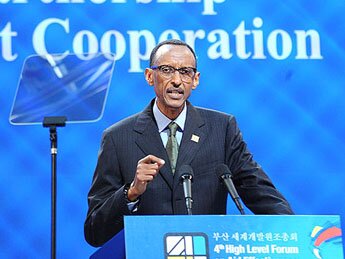Busan: Strong leaders not taking a back seat
 President Paul Kagame Photo Credit The Rwanda Focus |
At the end of November, world leaders gathered in Busan, Korea to discuss progress on the implementation of the Paris Declaration and the integration of aid effectiveness into the development agenda.
The Fourth High Level Forum on Aid Effectiveness resulted in a document describing the way forward called the Busan Partnership for Effective Development Co-operation, which was signed by ministers of developed and developing countries as well as civil society.
This document, however, was not agreed upon without debate. And leading the developing countries’ push for greater ownership of aid was Rwanda’s President, Paul Kagame.
Rwanda is a focus country of Tony Blair’s Africa Governance Initiative (AGI), along with MLI partner country Sierra Leone. AGI works in select African countries with government leaders that demonstrate a strong political will for reform and works hand in hand with these leaders to support the nuts and bolts needed to make reform happen.
Theses nuts and bolts are often the government systems that donors circumvent because they are viewed as weak or ineffective. However, their weakness should be the very reason that donors invest in them, Kagame said in Busan.
"While donors may not be entirely to blame for bypassing these systems where they are weak, or non-functional, why not use aid to build up and strengthen such critical systems?"
Currently, only 45 percent of aid to Rwanda is channeled through its national budget system, Rwandan Minister of Finance, John Rwangombwa, told The Guardian. Ideally that figure should be 100 percent.
Without a single path for aid, money, as well as precious human resources, are wasted.
"Developing countries spend more time and energy agreeing on procedures and accounting to donors and an ever-increasing number of related non-state actors than in actual development work, often responding to endless questioning that no answers can fully satisfy," Kagame said.
This complaint is not new for developing countries. Last month, MLI’s newest publication, Improving Country Capacity for Aid Coordination, reported that on average many developing countries receive over 800 new projects annually, host more than 1,000 monitoring missions, and prepare and present 2,400 quarterly progress reports.
This is why leaders such as Kagame called for increased donor coordination to follow priorities set by countries and not donors.
And countries are fully capable of leading as exemplified by Kagame’ determination in Busan or Sierra Leone’s President Ernest Bai Koroma who recently stated that his country will become a middle-income country in the next 50 years.
These strong leaders of Africa are not taking the backseat and people are noticing. At Busan, USAID Administrator Rajiv Shah issued a joint statement with Tony Blair recognizing that, "incredible men and women who are shaking the old narrative of a dormant Africa and replacing it with one of optimism, determination and progress."
Keyword Search
MLI works with ministries of health to advance country ownership and leadership. This blog covers issues affecting the ministries and the people they serve.
Connect with Us
![]()
![]()
Categories
Blogs We Like
- Africa Can End Poverty
- Africa Governance Initiative
- Behind the Numbers
- CapacityPlus
- Center for Global Health R&D Policy Assessment
- Center for Global Development: Global Health Policy
- Center for Health Market Innovations
- Global Health
- Global Health Hub
- Global Health Impact
- The New Security Beat
- PAI Blog
- RH Reality Check
- Save the Children
- Transparency and Accountability Program
Contact Us
Please direct all inquiries to
